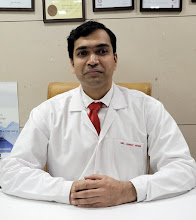Glaucoma is a disease that causes loss of sight by damaging a part of the eye called the optic nerve. This nerve carries information from eyes to brain.
Glaucoma is an eye disease which causes loss of sight by damaging the optic nerve. This nerve carries information from your eyes to your brain.
When glaucoma damages your optic nerve, one first loses patches of vision, usually side vision . Over a period of time, glaucoma may also damage central vision. You may not notice a loss of vision until you
have lost a great deal of your sight. When checking for glaucoma, eye specialist usually look for damage to the optic nerve and any loss of vision. They will also check your eye pressure. Glaucoma is called the ‘silent killer of vision’ because people usually do not notice any signs of the disease until too late. Once lost, vision cant be recovered
Who is at Risk for Glaucoma?
These risk factors may increase your chance of having glaucoma:
Age: The older you are, the greater your risk
Race: Certain races have higher risk for glaucoma
Family history : If your first degree relative has glaucoma, you have increased risk
Systemic history: Diabetes mellitus, previous eye injuries, eye surgery or long-term steroid use anywhere in the body can increase your risk of glaucoma
Investigations:
Tonometry: the pressure of the eye is measured
Pachymetry: Thickness of the cornea (the front window of the eye) may affect the pressure reading and the risk of glaucoma progression, pachymetry is The medical terminology for measurement of central corneal thickness.
Ophthalmoscopy: To examine the Optic nerve
Gonioscopy: To examine the area in the front of the eye known as the drainage angle.
Perimetry: Evaluates your visual field.
Photography: This is a documentary proof of the existing appearance of your nerve in color and black and white. It can be used as a visual record of the nerve appearance over a period of time.
All the above tests will be done at the time of diagnosis and a systematic document would be made that would help the doctor treat you in the best possible way. Some of the above tests need periodic repetition that has a specific scientific logic. Please ask your doctor and understand the details and the logic behind such a routine. This will greatly enhance the way you understand your disease.
Treatments: Glaucoma can usually be treated and controlled using medicine(s), laser surgery, glaucoma surgery or a combination of these treatments. Medicines (eye drops) are typically the first step in treatment, but laser surgery may be just as effective as a first choice. Your treatment is up to you and your doctor
Treating Glaucoma with Medicines: Doctors prescribe many types of medication to treat glaucoma. These drugs lower the pressure inside the eye. Often, people with glaucoma have to take these medicines for life to control the pressure and limit vision loss. Remember, you and your doctor must work together to determine the best medicines for you.
Treating Glaucoma with Laser Surgery
Some people may need eye surgery to control their glaucoma. Lasers are very useful for treating glaucoma because they avoid cutting and have a lower chance of complications (compared to glaucoma surgery).
There are three common laser procedures:
Laser trabeculoplasty
Peripheral iridotomy
Laser cyclophotocoagulation.
Treating Glaucoma with Glaucoma Surgery
Filtering surgery
Drainage implant surgery


No comments:
Post a Comment